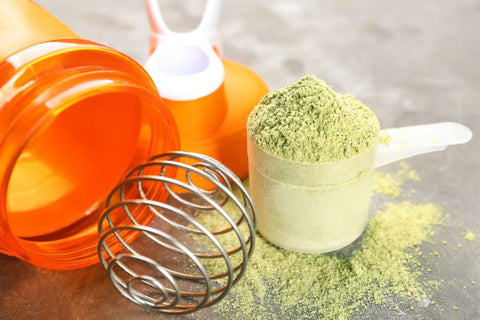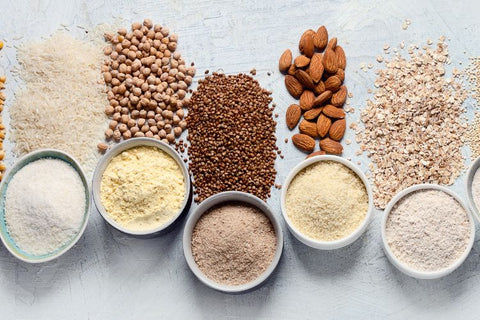Are you curious about the benefits of gluten-free protein powders? In today's health-conscious world, many individuals are turning to alternative protein sources to meet their dietary needs. Gluten-free protein powders have gained popularity for their nutritional advantages and suitability for various dietary restrictions. In this article, we will explore the numerous benefits of gluten-free protein powders and how they can positively impact your health and well-being.
Complete Protein Source
Regular protein sources, like meat, poultry, fish, eggs, and dairy, are naturally considered complete proteins because they contain all nine essential amino acids your body needs but cannot synthesize on its own. However, gluten-free protein powders, derived from plant sources, require a bit more explanation to achieve completeness.
Here's why achieving a complete protein profile is important:
- Essential Amino Acids: These nine amino acids are the building blocks of protein and play crucial roles in various bodily functions, including muscle building and repair, enzyme production, and hormone regulation.
- Completeness Matters: If you're not consuming enough of all nine essential amino acids, your body's ability to utilize protein for these functions can be compromised.
Now, let's explore how gluten-free protein powders can achieve completeness:
- Single Source (Almost):
- Certain Plant Proteins: Some plant proteins, like soy protein, are considered "nearly complete proteins." They contain all nine essential amino acids, but the amount of one or two essential amino acids, like lysine, might be slightly lower than the ideal amount.
- Consumption Strategies: If you're using a single-source, nearly complete plant protein powder like soy, consuming enough throughout the day or strategically combining it with other complementary plant-based protein sources during meals or snacks can help ensure you meet your essential amino acid requirements.
- Blending for Balance:
- Mixed Plant Protein Powders: These powders combine protein isolates or concentrates from various plant sources. By strategically choosing complementary plant proteins, manufacturers aim to create a blend that offers a more complete and balanced amino acid profile.
- Example: Brown rice protein might be lower in lysine, but combining it with peas, which are rich in lysine, can create a more complete amino acid profile in the overall blend.
- Fortification (Less Common):
- Adding Limiting Amino Acids: In some cases, manufacturers might add specific essential amino acids, like lysine, to a single-source plant protein powder to create a complete protein profile. However, this fortification approach is less common.
Muscle Building and Repair
Building and maintaining muscle mass is an important aspect of overall health and fitness. Whether you're a seasoned athlete or someone just starting a strength training program, ensuring you consume enough protein is essential. Here's how gluten-free protein powders can contribute to your muscle-building efforts:
- Muscle Tissue: Muscles are primarily composed of protein. When you engage in exercise, especially strength training, you create microscopic tears in your muscle fibers. This breakdown is a natural part of the muscle-building process.
- Repair and Rebuild: To repair and rebuild these microtears, your body needs protein to synthesize new muscle tissue. This is where consuming adequate protein becomes crucial.
How Gluten-Free Protein Powders Fit In
- Convenience and Concentration: Gluten-free protein powders offer a convenient and concentrated way to increase your protein intake, especially if you struggle to meet your needs through whole food sources alone. This ensures your body has the raw materials it needs for muscle repair and growth.
- Amino Acid Availability: Muscle building and repair rely on a specific set of amino acids, including branched-chain amino acids (BCAAs). Many gluten-free protein powders, particularly those derived from soy or peas, are rich in BCAAs, which can support muscle protein synthesis.
Types of Gluten-Free Protein Powders and Muscle-Building
- Soy Protein: A complete protein source naturally high in BCAAs, making it a well-established option for muscle building.
- Rice Protein: A hypoallergenic and easily digestible protein source, but might be slightly lower in some essential amino acids like lysine. However, it can still contribute to muscle building when consumed as part of a balanced diet.
- Hemp Protein: A nearly complete protein source with a good balance of all essential amino acids, including BCAAs. It can be a suitable option for those seeking a plant-based protein source for muscle support.
- Mixed Plant Protein Powders: These blends strategically combine various plant proteins to create a more complete and balanced amino acid profile, potentially enhancing muscle protein synthesis compared to single-source options.
Digestive Health
Our digestive system plays a vital role in our overall health and well-being. For some people, certain food components can trigger discomfort or disrupt digestion. Gluten-free protein powders have emerged as a popular option, but how exactly do they benefit digestive health? For people with certain digestive concerns, gluten-free protein powders can offer some advantages:
- Suitable for Celiac Disease and Gluten Sensitivity: If you have celiac disease, an autoimmune disorder triggered by gluten, consuming gluten-free protein powder eliminates the risk of triggering an immune response that damages your small intestine. Similarly, for those with gluten sensitivity, gluten-free protein powders prevent uncomfortable digestive symptoms like bloating, gas, or diarrhea.
- Lactose-Free Options: Many gluten-free protein powders are naturally lactose-free or use lactose-free milk sources for mixing, which can be beneficial for those with lactose intolerance. Lactose intolerance can cause digestive discomfort like bloating, gas, and cramps after consuming dairy products.
- Plant-Based Options May Be Easier to Digest: Some people find plant-based protein powders easier to digest compared to animal-based protein sources like whey protein. This can be due to individual sensitivities or digestive issues related to whey protein.
- May Contain Probiotics or Digestive Enzymes (Less Common): A small number of gluten-free protein powders are fortified with probiotics or digestive enzymes. Probiotics are live bacteria that can contribute to a healthy gut microbiome, while digestive enzymes can aid in breaking down protein for easier absorption.
Weight Management
While gluten-free protein powders aren't magic weight-loss solutions, they can be helpful tools when incorporated into a healthy weight management plan. Here's how they might assist your efforts:
Promotes Satiety:
- Protein Power: Protein is known for its satiating properties. It helps you feel fuller for longer, potentially reducing cravings and overall calorie intake throughout the day. This can be particularly beneficial if you struggle with hunger pangs between meals.
- Meal Replacements: Some people use protein shakes made with gluten-free protein powder as meal replacements, especially for breakfast or snacks. This can be a convenient way to control calorie intake if done strategically.
Boosts Metabolism (Slightly):
- The Thermic Effect: The body burns calories during digestion. Protein has a higher thermic effect compared to carbohydrates or fats. This means your body burns slightly more calories digesting protein than other macronutrients.
Muscle Preservation:
- Weight Loss and Muscle Loss: During weight loss, there's a risk of losing muscle mass along with fat. Protein helps preserve muscle tissue, which is metabolically active and contributes to burning more calories at rest.
Blood Sugar Regulation
While gluten itself doesn't directly impact blood sugar, some gluten-free protein sources can play a role in blood sugar regulation. Here's a breakdown of how certain gluten-free protein powders might influence blood sugar:
The Glycemic Index (GI) and Blood Sugar:
- Understanding GI: The glycemic index (GI) is a ranking system that assigns a value to foods based on their impact on blood sugar levels. High-GI foods cause blood sugar to spike rapidly, while low-GI foods lead to a more gradual rise.
- Protein and Blood Sugar: In general, protein has a minimal impact on blood sugar compared to carbohydrates. This is because the body processes protein for building and repair rather than using it directly for energy, which can cause blood sugar spikes.
Specific Gluten-Free Protein Sources and Blood Sugar:
- Soy Protein: Soy protein tends to have a moderate GI, meaning it might cause a slight rise in blood sugar but not as dramatic as some high-GI carbohydrates.
- Pea Protein: Pea protein generally has a low GI, making it a good choice for those concerned about blood sugar control.
- Brown Rice Protein: Brown rice protein can have a variable GI depending on processing methods. Opt for minimally processed brown rice protein for a potentially lower GI impact.
- Hemp Protein: Hemp protein typically has a low GI due to its combination of protein, healthy fats, and fiber.
Nutrient Density
Beyond the protein punch, some gluten-free protein powders offer additional nutrients that can enhance their overall nutritional value. While protein is the star of the show, some gluten-free protein powders might include additional nutrients depending on the source and processing methods. These can include:
- Fiber: Small amounts of fiber might be present, especially in powders derived from whole grains or seeds like hemp. Fiber can promote digestive health, support feelings of fullness, and potentially aid in blood sugar management.
- Healthy Fats: Some plant-based protein sources, like hemp seeds or nuts, might contribute a small amount of healthy fats to the powder. These fats can promote satiety, support heart health, and contribute to nutrient absorption.
- Vitamins and Minerals: Depending on the source protein, trace amounts of vitamins and minerals might be present. For example, brown rice protein might contain some B vitamins, while pea protein might offer a small amount of iron.
Vegan and Vegetarian Support
Gluten-free protein powders align perfectly with vegan and vegetarian diets for two key reasons: meeting protein needs and avoiding animal-derived ingredients. Here's a deeper dive into why they're a suitable option:
Protein Power for Plant-Based Eaters:
- Fulfilling Protein Requirements: Both vegans and vegetarians, especially those new to these dietary approaches, can sometimes struggle to meet their daily protein needs. Animal products are traditionally considered rich protein sources, so finding alternatives is crucial.
- Plant-Based Protein Sources: Gluten-free protein powders are derived from plant sources like peas, brown rice, hemp seeds, soy, or blends of these. This provides vegans and vegetarians with a convenient and concentrated way to increase their protein intake from plant-based sources.
Avoiding Animal-Derived Ingredients:
- Vegan Compliance: Vegans abstain from all animal products, including meat, poultry, fish, eggs, and dairy. Gluten-free protein powders, derived solely from plants, ensure vegans avoid any animal -derived ingredients, adhering to their dietary principles.
- Vegetarian Compatibility: While vegetarians typically exclude meat and poultry, they might include eggs and dairy in their diets. Gluten-free protein powders offer a suitable option for vegetarians who avoid dairy or simply prefer plant-based protein sources.
Allergen-Friendly
Navigating a world of food allergies and sensitivities can be tricky, especially when it comes to protein sources. Many popular protein powders are derived from milk (whey, casein) or contain wheat derivatives, which can trigger uncomfortable reactions in people with celiac disease, gluten sensitivity, or dairy allergies.
Gluten-free protein powders address allergies and sensitivities in two primary ways:
- Avoiding Allergens: By excluding gluten-containing grains like wheat, barley, and rye, these powders eliminate a common allergen for individuals with celiac disease or gluten sensitivity.
- Offering Alternative Protein Sources: Many gluten-free protein powders are derived from plant-based sources like peas, brown rice, hemp seeds, or soy. This provides options for those with allergies to animal-derived proteins found in common protein powders, such as whey or casein (from milk).
Energy Boost
While gluten-free protein powders themselves don't directly provide an energy boost like a quick-burning sugar source, they can contribute to sustained energy levels in several ways:
- Staving Off Crashes: Protein is known for its satiating properties. It helps you feel fuller for longer, preventing dips in blood sugar that can lead to energy crashes. By keeping you feeling satisfied, gluten-free protein powders can help you maintain consistent energy levels throughout the day.
- Muscle Support: During exercise, your body breaks down muscle tissue for energy. Protein is essential for repairing and rebuilding these microtears. Consuming protein after exercise or throughout the day can support muscle recovery, which can indirectly improve your overall energy levels.
- Building Endurance: Adequate protein intake can contribute to improved exercise performance and endurance. This translates to being able to exert yourself for longer durations, indirectly impacting your overall energy levels for activities throughout the day.
Bone Health
Maintaining strong bones is crucial throughout life, and dietary protein plays a significant role. While gluten itself doesn't directly impact bone health, certain gluten-free protein sources offer valuable nutrients that contribute to building and maintaining strong bones. Here's how some popular gluten-free protein powders can be bone-friendly allies:
Calcium: The Bedrock of Bones:
- Calcium's Role: Calcium is the primary mineral in bones, providing structure and strength. Consuming adequate calcium is essential for bone formation and density throughout life, especially as we age and bone loss becomes a concern.
- Plant-Based Calcium Sources: Some gluten-free protein powders, particularly those derived from legumes like lentils or chickpeas, can offer a small amount of calcium. Additionally, some manufacturers fortify their powders with calcium to enhance their bone-supporting potential.
Plant-Based Protein Powerhouses and Bone Health:
- Soy Protein: Studies suggest that soy protein may contribute to bone health, potentially due to its isoflavones, which have some estrogen-like effects. Estrogen plays a role in bone health, and soy isoflavones might offer benefits similar to estrogen, especially for postmenopausal women.
- Other Plant Protein Sources: While research is ongoing, some studies suggest that other plant protein sources like peas may also have bone-health benefits. This might be due to their nutrient profile, which can include phosphorous, magnesium, and certain vitamins that contribute to overall bone health.
Conclusion
The nutritional benefits of gluten-free protein powders underscore their significance in today's health-conscious landscape. From providing a complete protein source to supporting muscle building and repair, aiding in digestive health, and assisting with weight management, these powders offer a myriad of advantages. Moreover, their compatibility with vegan, vegetarian, and allergen-sensitive diets, along with their potential contributions to blood sugar regulation, nutrient density, energy levels, and bone health, further highlight their importance in promoting overall well-being. As individuals increasingly prioritize health-conscious dietary choices, gluten-free protein powders emerge as a valuable option, offering convenience, versatility, and numerous health benefits to support a balanced and nourishing lifestyle.






